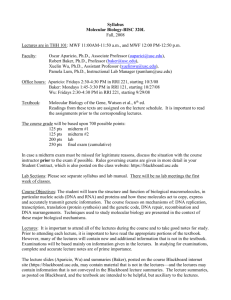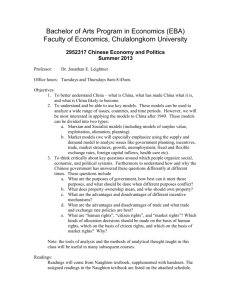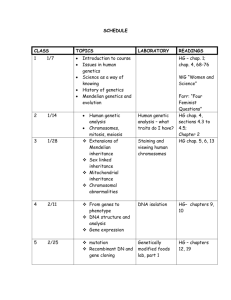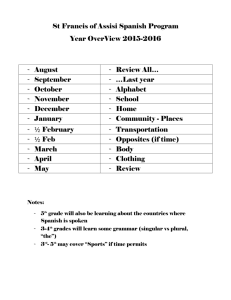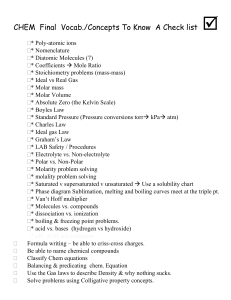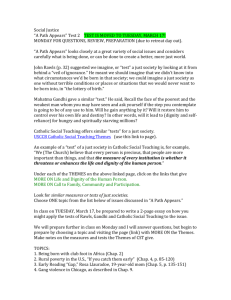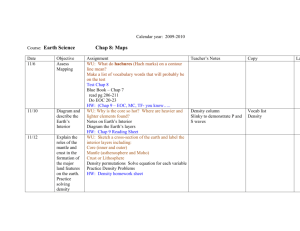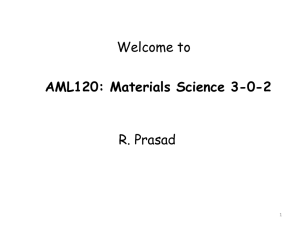Chap 15
advertisement
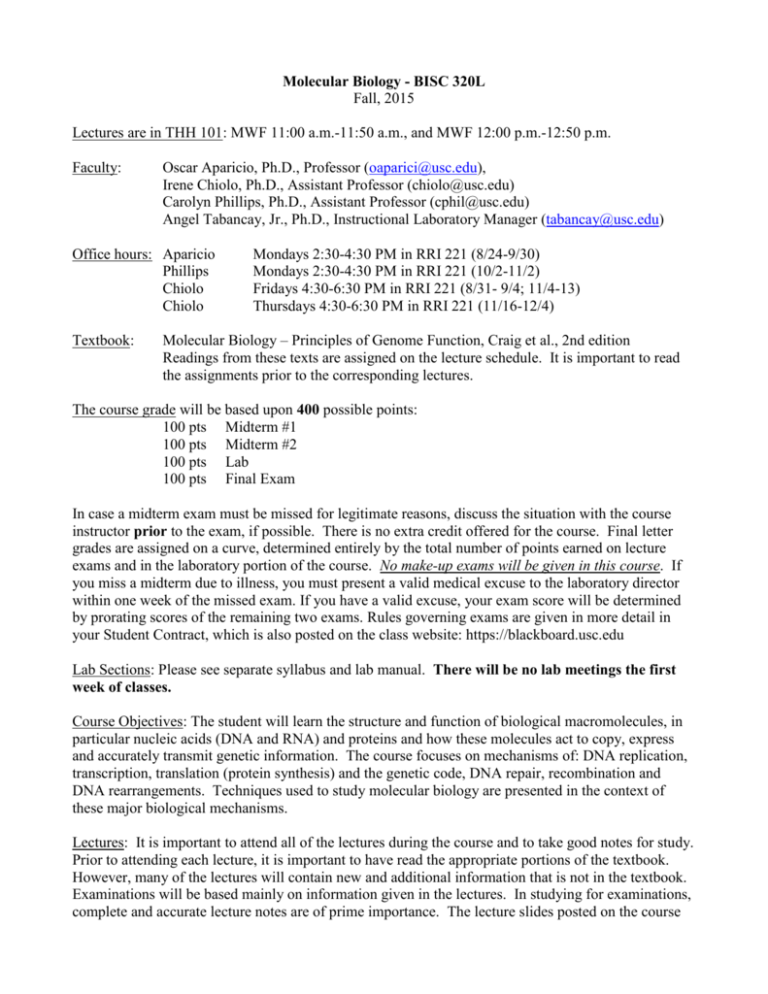
Molecular Biology - BISC 320L Fall, 2015 Lectures are in THH 101: MWF 11:00 a.m.-11:50 a.m., and MWF 12:00 p.m.-12:50 p.m. Faculty: Oscar Aparicio, Ph.D., Professor (oaparici@usc.edu), Irene Chiolo, Ph.D., Assistant Professor (chiolo@usc.edu) Carolyn Phillips, Ph.D., Assistant Professor (cphil@usc.edu) Angel Tabancay, Jr., Ph.D., Instructional Laboratory Manager (tabancay@usc.edu) Office hours: Aparicio Phillips Chiolo Chiolo Textbook: Mondays 2:30-4:30 PM in RRI 221 (8/24-9/30) Mondays 2:30-4:30 PM in RRI 221 (10/2-11/2) Fridays 4:30-6:30 PM in RRI 221 (8/31- 9/4; 11/4-13) Thursdays 4:30-6:30 PM in RRI 221 (11/16-12/4) Molecular Biology – Principles of Genome Function, Craig et al., 2nd edition Readings from these texts are assigned on the lecture schedule. It is important to read the assignments prior to the corresponding lectures. The course grade will be based upon 400 possible points: 100 pts Midterm #1 100 pts Midterm #2 100 pts Lab 100 pts Final Exam In case a midterm exam must be missed for legitimate reasons, discuss the situation with the course instructor prior to the exam, if possible. There is no extra credit offered for the course. Final letter grades are assigned on a curve, determined entirely by the total number of points earned on lecture exams and in the laboratory portion of the course. No make-up exams will be given in this course. If you miss a midterm due to illness, you must present a valid medical excuse to the laboratory director within one week of the missed exam. If you have a valid excuse, your exam score will be determined by prorating scores of the remaining two exams. Rules governing exams are given in more detail in your Student Contract, which is also posted on the class website: https://blackboard.usc.edu Lab Sections: Please see separate syllabus and lab manual. There will be no lab meetings the first week of classes. Course Objectives: The student will learn the structure and function of biological macromolecules, in particular nucleic acids (DNA and RNA) and proteins and how these molecules act to copy, express and accurately transmit genetic information. The course focuses on mechanisms of: DNA replication, transcription, translation (protein synthesis) and the genetic code, DNA repair, recombination and DNA rearrangements. Techniques used to study molecular biology are presented in the context of these major biological mechanisms. Lectures: It is important to attend all of the lectures during the course and to take good notes for study. Prior to attending each lecture, it is important to have read the appropriate portions of the textbook. However, many of the lectures will contain new and additional information that is not in the textbook. Examinations will be based mainly on information given in the lectures. In studying for examinations, complete and accurate lecture notes are of prime importance. The lecture slides posted on the course Blackboard site (https://blackboard.usc.edu) may contain material that is not in the lectures and the lectures will often contain additional information that is not conveyed in the slides. Lecture attendance is essential. It may be necessary to make some adjustments in the syllabus during the semester. Date Week 1 8/24-28 Week 2 8/31- 9/4 Week 3 9/9-11 Week 4 9/14-18 Week 5 9/21-25 Week 6 9/28-30 Week 6 10/2 Week 7 10/5-9 Week 8 10/12-16 Week 9 10/19-23 Week 10 10/26-30 Week 11 11/2 Reading assignment Chap 1 and 2 Prof. Aparicio lectures Chap 2 (Aparicio) Chap 4 and 14.9 (Chiolo covers lectures 9/2-4) Chap 3 and 5 9/7 is Labor Day Chap 6 Biological molecules Chromosome structure and Function Chemical Basis of Life and Cell Cycle Chap 6 and 19.3, 19.4, 19.8 DNA Replication, DNA Sequencing, Polymerase Chain Reaction (PCR) Chromosome Segregation Chap 7 (9/28). Midterm 1 (9/30). You must take each midterm in the lecture period in which you are registered. Prof. Phillips begins lecturing Chap 8 Chap 8 and 9 Chap 10 Chap 11 and 12 Chap 12 and 13 Midterm 2. You must take the midterm in the lecture period in which you are registered. Week 11 Prof. Chiolo begins lecturing 11/4-6 Chap 15 Week 12 Chap 15 11/9-13 Week 13 11/16-20 Week 14 11/23 Week 15 11/3012/4 12/14 Topics covered Genomes and the flow of Biological Information “Central Dogma”, Biological molecules Chap 16 and 19.13 Chap 16 Chap 17 Final Exam - 4:30 PM DNA Replication Transcription Transcription, regulation of transcription, gene silencing RNA processing, splicing, editing, RNA-binding domains Translation and the ribosome, regulation of translation Regulation of translation, regulatory RNAs, small RNAs, long non-coding RNAs Types of damages and repair pathways (MMR, Direct Reversal, BER) Types of damages and repair pathways (NER, TLS), cellular responses to DNA damage, DSB repair Homologous recombination Regulation of Homologous Recombination, HR proteins, meiotic recombination, Transposons, site-specific recombination, VDJ recombination Statement on Academic Integrity. USC seeks to maintain an optimal learning environment. General principles of academic honesty include the concept of respect for the intellectual property of others, the expectation that individual work will be submitted unless otherwise allowed by an instructor, and the obligations both to protect one’s own academic work from misuse by others as well as to avoid using another’s work as one’s own. All students are expected to understand and abide by these principles. SCampus, the Student Guidebook, contains the Student Conduct Code in Section 11.00, while the recommended sanctions are located in Appendix A: http://www.usc.edu/dept/publications/SCAMPUS/gov/. Students will be referred to the Office of Student Judicial Affairs and Community Standards for further review, should there be any suspicion of academic dishonesty. The Review process can be found at: http://www.usc.edu/student-affairs/SJACS/. Statement For Students With Disabilities: Students requesting academic accommodations based on a disability are required to register with Disability Services and Programs (DSP) each semester. A letter of verification for approved accommodations can be obtained from DSP when adequate documentation is filed. Please be sure the letter is delivered to Dr. Tabancay as early in the semester as possible. DSP is open Monday-Friday, 8:30 to 5:00, (213) 740-0776.
